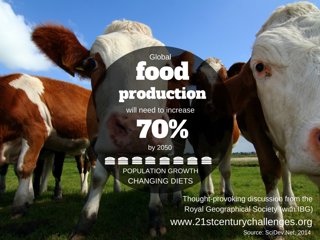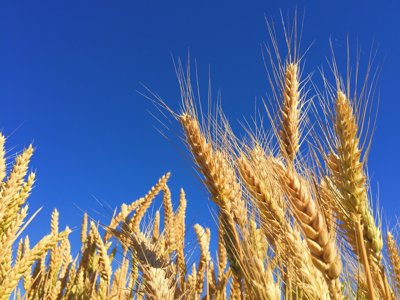What’s the Challenge?
Our global food system is under increasing strain. A changing climate, pests, and stresses on water and land use have made life increasingly difficult for farmers. Raising livestock for meat also uses a lot of land and energy which is under increasing demand from a rising population and growing middle class. How can we produce and supply enough safe and nutritious food in a sustainable way to a population which is expected to rise to 9 billion by 2050?
By 2050 there will be a world population of 9.2 billion. We will need 70% more food to be produced to cope with the massive expansion of urban living, the rise of the middle classes (predominantly in the BRIC nations), climate change and resource scarcity.
There is enough food to go round if it is evenly distributed. There have been significant attempts to reduce poverty and hunger, with initiatives such as the ‘The Green Revolution’, which greatly increased agriculture production in many regions of Asia.
This is not purely a technological problem, but technology has a key part to play. In recognition of this, there are currently a number of new agricultural technologies being researched and developed. This 21CC event asks: what are the challenges in feeding the 9 billion?
The Royal Geographical Society (with IBG) held a panel discussion on 30 October 2013 to discuss the issue.
Jay Rayner is an award-winning writer, journalist, broadcaster and author of ‘Greedy man in a hungry food’, with a fine collection of floral shirts. He has written on everything from crime and politics, through cinema and theatre to the visual arts, but is best known as restaurant critic for the Observer. For a while he was a sex columnist for Cosmopolitan; he also once got himself completely waxed in the name of journalism. He only mentions this because it hurt.
Jay is a former Young Journalist of the Year, Critic of the Year and Restaurant Critic of the Year, though not all in the same year. Somehow he has also found time to write four novels and two works of non-fiction. He is a regular on British television, where he is familiar as a judge on Masterchef and, since 2009, as the resident food experts on The One Show. He likes pigs.
Food waste
Would there be enough food to feed everyone if we didn’t waste so much? Campaigner Edd Colbert discusses an innovative London-based project ‘The Pig Idea’ which has been addressing the problem.
Edd Colbert is Campaign Coordinator for The Pig Idea, London’s latest food waste campaign that aims to divert food waste to livestock feed, reducing our dependency on imported cereal crops and improving farming’s impact on the environment.
“97% of soya and 60% of global maize production is sent directly to the feeding of animals rather than the feeding of people.” Edd Colbert
Although a dedicated vegan, he’s also an advocate for sustainable, high welfare livestock farming with keen interests in the issues of food sovereignty, animal welfare, food waste, and supply chains. You can follow him @eddcolbert

Science and technology
Can new technology play a part in helping us produce more food with less space? And can we produce food that’s better able to withstand disease and a changing climate? In this 21st Century Challenges video Tim Wheeler, Professor of Crop Science, gives case studies of new ways science is contributing to food security.
Tim Wheeler is Deputy Chief Scientific Adviser and Director of Research and Evidence Division at the UK Department for International Development, where he oversees most of the research that the Department commissions.
Tim is also Professor of Crop Science at the University of Reading. He has published numerous scientific papers during the last 20 years on climate change impacts on agriculture and food sustainability, including in Nature and Science.
Tim has provided advice and evidence on the sustainability of food and farming to Ministers, food multinationals, UK and international policy-makers, and acted as Specialist Adviser to the House of Lords in 2010. He frequently communicates scientific issues to wider audiences through public events, radio or television.
Edible insects
2 billion people around the world currently supplement their diet with insects. Should the rest of us do the same?
Peter Smithers is an entomologist based in Plymouth. He is a Fellow of the Royal Entomological Society and Editor of the Royal Entomological Societies Bulletin, Antenna.
He is passionate about Entomophagy, the consumption of insects as food and has teamed up with Devon-based Michelin starred chef Peter Gorton to produce a range of edible insect dishes.
His public engagement activities include talks for schools, workshops at the Royal Entomological Society’s Insect Festival, exhibitions and coordination of the world’s first dance show based on insect movements, Syncapoda’ at the Barbican Centre.
Peter is a regular contributor to the media including the Times, Daily Telegraph, BBC Really Wild Show and Richard and Judy Show and has been an advisor to BBC Natural History programmes, such as the David Attenborough series Life in the Undergrowth.
Food miles and prices
Global food prices are worryingly high which can result in social and political implications. According to the FAO, food prices reached an all-time high in February 2011, a spike that was even more pronounced than in 2008. According to the International Food Policy Research Institute (IFPRI), there are three main reasons for food price increases; biofuel production taking up land and driving the price up, commodity trading, and climate change. The 2008 food price spike caused riots or civil unrest in a number of countries. Large short-term food price changes can have long-term impacts on development. Fluctuating income can reduce children’s consumption of key nutrients which has knock on effects on e.g. education, health, which can later slow economic development. 36 countries sent out appeals for food aid in 2008 because of high local high prices, crop failures or conflict.
Further reading
The ‘Behind the Brands’ Campaign, Danielle Smith, Oxfam, for ‘Ask the experts’
Food globalisation, Associate Professor Ian Cook for ‘Ask the experts’
Food, Glorious Food… What Next is the Question? Geography Directions
Local solutions to global food shortages, I-Hsien Porter, Geography Directions
Climate Change and Inuit Food Security, Paulette Cully, Geography Directions
Learning for food, I-Hsien Porter, Geography Directions
Lashings of local food: alternative food networks, Jayne Glass, Geography Directions, 2010
The $250,000 burger: towards a new moral economy of meat-eating?, Geography Directions
Consumption, Behaviour Change and Sustainability, Geography Directions
Defining ‘local’ food, Geography Directions
